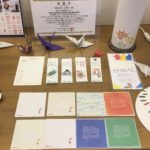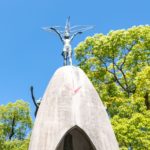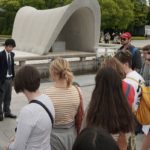3 “Thoughts and Wishes”
A-bomb survivors have continued to advocate “a nuclear-free world” after the so-called “lost decade”17). At the same time, they have proclaimed it as a serious message of a-bomb survivors both in Japan and abroad. It is a strong desire for “No More Hiroshima,” “No More Nagasaki” and “No more Hibakusha” based on their terrible experience that drives them to continue to send the same message for more than 60 years. As is often pointed out, the campaign against nuclear weapons is essential to movements concerning a-bomb survivors. In order to realize this goal, various projects, such as international activities, signature-collecting campaigns intended for petitions to the Diet, and protest movements have all been actively conducted 18). 6,782 responses (testimonies) in the 2005 survey by the Asahi Shimbun show this. In the responses, words such as “world,” “peace,” “nuclear weapons” and “nuclear” frequently appear, clearly proving that “world peace” brought by “the abolition of nuclear weapons” is a core part of a-bomb survivors’ message and their thoughts and wishes 19). Messages of a-bomb survivors who advocate world peace without nuclear weapons and who lead the discourse regarding nuclear abolition are summarized here. Examples of “nuclear weapons,” “nuclear” and “world peace” are shown below.
Examples of “nuclear” and “nuclear weapons” in the comments in the survey “60th Anniversary of the Atomic Bombing Questionnaire” by the Asahi Shimbun
I feel sorry. People from all over the world will give up nuclear weapons and stop wars. We are all human beings
Considering the sadness of these people, it is unforgivable to take away precious lives by nuclear weapons
I hope they disappear quickly. If there is a nuclear war, mankind will be destroyed. Next generations
I want to appeal that it is an absolute evil. I want to shout nuclear abolition
I hate wars. I pray that people can live in peaceful countries without nuclear weapons
Examples of “nuclear” and “nuclear weapons” in the comments in the survey “60th Anniversary of the Atomic Bombing Questionnaire” by the Asahi Shimbun
I never forget. I always wish for world peace and the welfare of Japan
For world peace and the well-being of mankind, “Wars and nuclear weapons to be abolished
We have promoted projects to abolish nuclear weapons and we hope world peace be established From the bottom of my heart, I pray for the abolition of nuclear weapons and world peace.
I prayed for the prompt abolition of nuclear weapons in the world and the realization of world peace
However, there are not only the feelings mentioned above, but also resentment against the atomic bombing, bitter feelings about an apology for the atomic bombing and responsibility for it. Since details were argued in a paper (Kawamoto/Kawano, 2015), I will not go further here. There is hatred against the United States which dropped the atomic bombs and there is also a feeling that an apology from that country should be sought. In addition, there is a feeling that the responsibility of the atomic bombing should be investigated, for both Japan and the United States. Despite having feelings such as resentment and seeking responsibility for the atomic bombings, a-bomb survivors advocate “a nuclear-free world” and call for world peace. Although they have complicated feelings, a-bomb survivors overcome these feelings and appeal for “world peace” and “a nuclear-free world.” I would like to include these feelings in survivors’ thoughts. At the same time, we have a responsibility to understand such feelings and convey them to succeeding generations.
17) The Lost Decade was the term adopted by the head of the Japan Confederation of A- and H-Bomb Sufferers Organizations, Tsuboi Nao, to describe the period when “for those who had somehow survived, those ten years [1945-1955], when the support of the administration was a drop in the bucket, when survivors could not even support families and loved ones, when there was no one to really talk to and no real organization, there was just nothing to do but to bear it, day by day, one step at a time,” according to a publication by the group.
18) For details, see the home page of the Japan Confederation of A- and H-Bomb Sufferers Organizations. (Accessed January 26th, 2018.)
19) For details, see the author’s own work (2010a) and (2010b).
20) To cite just one example, to the question, “Do you ever feel resentment towards the country which dropped the bomb, the United States?” from among 1,934 respondents, 23%, or 446 said, “I feel resentment.” 54%, or 1,050, said, “I felt resentment in the past but do not feel it now.” Further, before American President Barack Obama’s visit, in 2015, according to a survey by the Asahi Shimbun, 43% of respondents stated that the American president should visit Hiroshima and Nagasaki and apologize.








